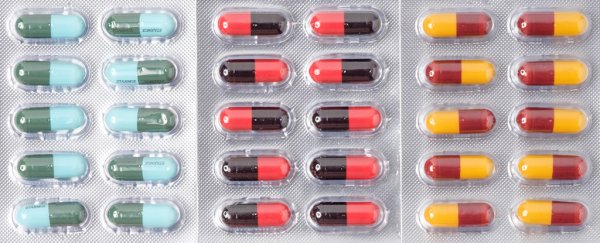As much trouble as we seem to be in right now due to the creeping issue of antibiotic resistance, imagine what the world would've looked like if the first antibiotic - penicillin - wasn't discovered almost 90 years ago. We owe a great deal to this fungi-derived wonder-drug, but our absolute reliance on it has now put us at risk.
According to the US Centres for Disease Control and Prevention, 23,000 people die each year around the world as a direct result of an infection by antibiotic-resistant bacteria, and the World Health Organisation has called antimicrobial resistance an increasingly serious threat to global public health. "New resistance mechanisms emerge and spread globally threatening our ability to treat common infectious diseases, resulting in death and disability of individuals who until recently could continue a normal course of life," the organisation says on its website. "Without urgent, coordinated action, the world is heading towards a post-antibiotic era, in which common infections and minor injuries, which have been treatable for decades, can once again kill."
It's pretty scary stuff, but a team of Swiss researchers from the University of Bern has come up with something that could be a solution. Publishing in the journal Nature Biotechnology, the team describes how liposomes - tiny, artificially prepared bubbles made from cell membrane material and used to deliver drugs for cancer, Hepatitis, influenza, and HIV-related diseases - can be used to destroy deadly bacterial toxins.
Led by cell biologists Eduard Babiychuk and Annette Draeger, the team engineered their liposomes to act like decoys, drawing toxic secretions away from bacteria so they can isolate and neutralise them. These toxins not only make us sick, but they're the only line of defense that invasive bacteria have. So once the toxins are neutralised by the liposomes, the weak and defenseless bacteria are easily eliminated by the host's immune system. The team has so far tested the engineered liposomes on mice infected with the deadly bacterial infection septicaemia, and each one survived with no antibiotic intervention.
"We have made an irresistible bait for bacterial toxins. The toxins are fatally attracted to the liposomes, and once they are attached, they can be eliminated easily without danger for the host cells", Babiychuk said in a press release.
"Since the bacteria are not targeted directly, the liposomes do not promote the development of bacterial resistance," Draeger adds.
According to Mary Beth Griggs at Popular Science, the researchers hope that not only will the liposomes protect the body from toxin damage, but by prompting the immune system to attack the weakened bacteria, they could help our bodies to rebuild our resistance to bacteria after a lifelong reliance on antibiotics. The liposomes could also make antibiotics more effective, they write, saying that the two could be used together "to combat bacterial infections and to minimise toxin-induced tissue damage that occurs during bacterial clearance".
The next step is a whole lot more lab and animal testing, but it's a promising step in the fight against antibiotic resistance.
Sources: Popular Science, the University of Bern
